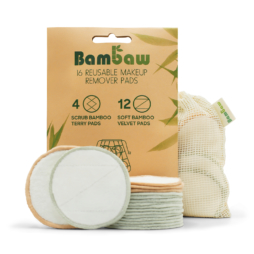Choose a cotton-free skincare routine
Taking care of our skin is something we all do everyday and it’s easy to reach for single-use face wipes after a long day of work or an evening with your friends. But have you considered the environmental impact of your routine? Forget buying a new pack of cotton pads and wipes each week! Reusable bamboo pads are far easier, cost efficient and sustainable. But don’t just take our word for it, here’s why…
The problem with cotton
According to the WWF it takes “20,000 liters of water to produce one kilogram of cotton; equivalent to a single t-shirt and pair of jeans”. The main environmental issues with cotton production include the use of agrochemicals (pesticides), water consumption and destruction of habitat.
But the WWF says that cotton production also causes:
- Soil erosion and degradation
- Pollution
- Water contamination
- Water scarcity
Cotton production begins on well-established land but the intensity of production leads to degradation of soil and expansion into new areas. This system repeatedly destroys habitats and soil quality. Cotton is also sprayed with more chemicals than any other crop. These pesticides and fertilisers have detrimental impacts on not only the environment but the nearby human population too: thousands of farmers and their families suffer from pesticide poisoning each year.
An example of the destruction cotton production causes is the Aral Sea in central Asia. Originally the 4th largest lake in the world, it has almost disappeared due to a colossal amount of irrigation. According to National Geographic, this has led to millions of marine death, receded coastlines and the nearby population has endured dust storms from toxic residue.
Ditch the face wipes and cotton buds
Despite being branded as ‘flushable’, wet wipes are less environmentally friendly than it appears. In fact, they make up 93% of blockages in UK sewers. The combination of cotton and polyester means that wet wipes take years to deteriorate, and when they do, small pieces of plastic remain floating in the sea. But even if you bin your wet wipes, the majority of them end up in landfill anyway.
Similarly, millions of cotton buds are flushed down the toilet every day. Their size and shape allow them to easily pass through sewage and drains straight into marine life. Not only are they a huge digestion hazard to marine animals, but the continual breakdown of plastic over hundreds of years releases toxins into the water.
Key statistics:
- 1.8 billion cotton buds are used in England each year. 10% are flushed down the toilet.
- Each day, 9.3 million wet wipes are flushed down the toilets.
- 35 million hectares of cotton are under cultivation.
- Cotton uses 6% of the worlds pesticides and 16% of insecticides, more than any other crop!
Wet Wipes Infographic
It is estimated that by 2025, two-thirds of the world’s population will suffer with water shortages because of the current consumption rate used for cotton. Whilst it’s a big challenge, you can be kinder to the planet by making a small change to your skincare routine.
Opt for reusable bamboo makeup remover pads
Bamboo is a great alternative because it’s fast-growing, its roots continue to thrive after harvest and it requires little maintenance as it’s 100% natural with no need for pesticides.
The benefits of using bamboo pads:
- They allow you to reuse the same piece of material again and again, meaning no waste!
- They’re soft on your skin
- Multi-purpose: you can use them for multiple skin products
- Cost-efficient
- Biodegradable
Our bamboo pads come in a mixture of 12 soft pads to remove every-day makeup and 4 scrub terry pads for long-lasting makeup and to exfoliate the skin. The pads come in a handy wash bag so all you have to do is pop them in with your normal wash and reuse!
Bamboo pads are an eco-friendly product that you can easily swap into your daily routine to help the planet and your skin

